Our suicide rates are skyrocketing again, and I’m going to spare you the faux-shock I could put on here, given that it would be frankly more surprising to me if our death toll had gone in the other direction.
Preliminary data from 2023-24 shows that our annual suicide deaths have surpassed 600, marking yet another annual increase in statistics that are already far too high. Our suicide numbers sit at double our road toll, and you’d think perhaps that would make it a big deal or something, given the ideological war NZACT are pushing over speed limit changes designed to reduce that number.
Our government have here too placed themselves firmly on the side of “death” as they play games with the future of the Suicide Prevention Office and ship what’s left of the mental health funding off to their mates like Mike King, a decision justified by bullshit figures on how effective their mental health help actually is, while their promises of mental health teams and a total system overhaul have been left by the wayside. Mike King is today defending claims that alcohol is “the solution” for mental health, by the way.
Suicide Prevention office continues with no full-time staff.
Most baffling is how the discussions of our suicide rate are accompanied by disclaimers like “We are aware suicide prevention is a complicated issue with many leading causes…”
Okay, but is it? Are people dying because suicide is complicated and there are many factors that contribute to it that are just so hard for us to tackle effectively, or are they dying because we know exactly what contributes to it and what helps prevent it and we are still doing the same actively harmful things we’ve always done (i.e. give people pills and then wash our hands of them)?
Don’t worry. Since we can’t afford a single full time suicide prevention worker to continue writing our National Suicide Prevention Plan, I’ve written it for us.
Get rid of the Single Point of Entry system.
The Single Point of Entry system is used as a gateway to divide all the people who can’t not be helped, from all the people who it would be beneficial to help but there just isn’t enough money for. Because we have a system with such stretched resources that has such a difficult time treating people, we make mentally ill people wait many months to attend a 2-3 hour long assessment with a panel of people, only one of whom actually needs to be there, where they’re diagnosed with a disorder or several (probably incorrectly), asked what help they think they need and then are told that help doesn’t exist. Basically, SPOE is a system of distributing brochures to all the places the mental health system would rather you go to for help — churches, women’s centres, university psychology studies you’re not actually eligible for, community programmes to teach you mental health strategies that you’re already using — regardless of whether that help is available or even helpful for you. They’ll tell you, as they discharge you (because that two hour interrogation counts as treatment, apparently) that you can be re-referred to them at any time (after another good long wait, and only so you can be discharged again, obviously) and that “you’ll be better with help from these places anyway.”
Help that never, ever eventuates.
Provide all suicidal patients with counselling upon presentation.
The mental health system has no counsellors, apparently. They have all the pills you could ever swallow, not that they’ll bother to prescribe you the ones you need until ten years down the track when you’re too fucked by your untreated mental health conditions for that to fix you anymore.
But there is a serious shortage of treating psychologists and qualified therapists to help people who want to kill themselves to a) not kill themselves and b) get better. Instead patients spend their first year or so in the mental health system being shunted around various other systems to see if anyone has a spare counsellor or maybe a therapy dog they could stick you in front of for an hour. If you’ve been sexually assaulted they’ll try and get you in under ACC (a year long assessment process that takes at least 5 pre-assessment sessions and then another several-hours-long assessment to tell you whether you’re covered). Hillmorton tried really hard to get me into a University of Otago study I was never eligible for, sending me back to them multiple times because “they will give you a therapist” (a shit reason to join a university psychology study — you should join because you want to try the methodology they’re testing, not because you have to sign up to have any hopes of accessing any help at all). They’ll desperately try to divert you down addiction treatment pathways to the point that I would now recommend any mental health patients lie through their teeth about any potential associated addiction with their mental health — they do not care what your issues are, only what issues get you out from in front of them.
Have the suicide hotline be open at least occasionally.
I’ve called the suicide hotline dozens of times over the past few years (before I eventually gave up bothering) and I would estimate that maybe 20% of the time, they are open and will answer you. Other non-suicide hotlines are prone to actually hang up on you while you try to get through to them, so that’s not ideal either. I would say that if more of the avenues for help were funded enough (or funded at all) that they could be open at least most of the time, this would go a long way to talking people out of killing themselves when they reach out for help to not do that. It’s a massive waste of time and a lost opportunity to provide support to suicidal people to have them ring up hotlines that aren’t even usually open.
Stop letting Crisis Resolution workers tell patients to go kill themselves.
Crisis Resolution is the formerly-DHB-based telephone line can be called up when you’re in crisis but it is also where you are referred to when your GP is notified that you’re suicidal. For some lucky winners, this means they get to be feeling shit already, have a crisis resolution worker call them up and make them worse, and then when you tell them that lack of treatment from the institution they are calling from is the REASON you’re going to end up killing yourself, they say “okay then” and hang up on you. And if you call back (because they called you about still-unresolved issues), there’s only one person on the phones that day. For the entirety of Christchurch!
I think if we hired crisis workers who specifically didn’t give suicidal patients permission to go kill themselves the moment someone says they want to do that, this could potentially shave a couple of numbers off that figure each year.
It’s gotta be worth a try, right?
Provide de-escalation training for all Crisis Resolution workers and front-line police officers who are likely to interact with people experiencing mental health crises.
Crisis resolution workers shouldn’t be more shit at calming down people in crisis than the reception workers who put you through to them, but somehow this is the reality. My interactions with cops and crisis has exclusively been ME attempting to deescalate the situation while the person whose job it is to actually do that seems determined to only ramp things up. My IPCA complaint about this was met with vague promises of mental health teams that have yet to eventuate; if we’re not going to get those, let’s return to my original suggestion of having front-line workers not make mental health crises worse as they’re happening.
Don’t direct suicidal patients down treatment pathways where there is no treatment available for them. Stop expecting patients to navigate this maze of non-treatment and rejection when they’ve come to you for help and are absolutely not in a position to trek this trail of not-really-appropriate mental health treatments, many of which don’t actually exist.
2022 was when I first went to the GP for some sort of mental health help (this time), and ever since then, I’ve been on the world’s least-fun scavenger hunt trying to find sparse caches of buried therapy that this poorly-drawn map says definitely exist. I’ve received brief intervention counselling (where I was unhelpfully referred to Hillmorton), short-term therapy from an intern psychologist via a community programme, and initial counselling sessions from ACC. None of this was the promised help the SPOE system directed me towards at all, and none of this help actually came from the Health NZ mental health system itself, but instead were things I stumbled upon after going around everywhere in the city begging for anything that anyone had that might be of any assistance (and also after paying for private diagnoses for things the mental health system couldn’t assess me for — which mattered for my eligibility for these treatments!).
I have spent two years playing a game of pass the parcel in which I am the world’s least-wanted unattended package, and the health system’s main priority is that someone else should be holding me when the music stops.
The primary concern of a suicidal patient is that someone treats them. The primary concern of the psychiatrist they’re sitting in front of is that someone else treats them. Anyone else.
Because this department - whatever department it is that you’re sitting in - doesn’t have the money.
If you do these six things — hell, if you just do number two on this list! — I personally guarantee your suicide rates will decrease.
Bonus idea 7: Abolish Hillmorton Hospital.
After a year of trying to receive treatment from Hillmorton, I now have a Do Not Refer order with them. No matter how bad my mental health is, I know that allowing them to “help” will be worse. If the semi-frequent “likes” my google review receives is anything to judge the situation by (it’s really the only effective way to complain about the lack of care there — our media, MPs and Ombudsman do not give a shit) there are many, many people out their receiving the same treatment.
Hillmorton has fifty+ years of negative reputation and is, at this point, tainted by its own history in the minds of past patients and the eyes of the wider Christchurch community. The only thing it can do as an institution is continue to traumatise new, unsuspecting patients referred there for help, while those of us with prior experience know to avoid them like the plague and take help from anywhere but. Better you develop a brand new addiction or pick up a seriously questionable coping mechanism than get treated by Hillmorton. It’ll be less damaging in the long run. Honestly.
The entire mental health delivery system is screwed, and if we really wanted to help suicidal patients, we could start by no longer sending them into the maws of uncaring inhuman systems who seem only interested in making patients worse (because that’s the only way they will ever treat you — if they fuck you up a bit more first).
Some joyous stories about Hillmorton from the past couple of years:

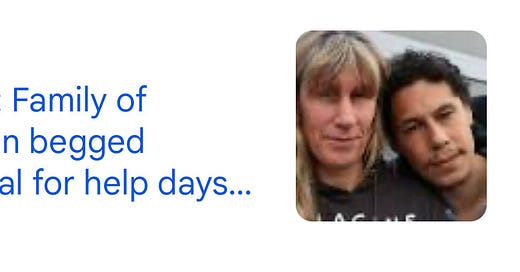



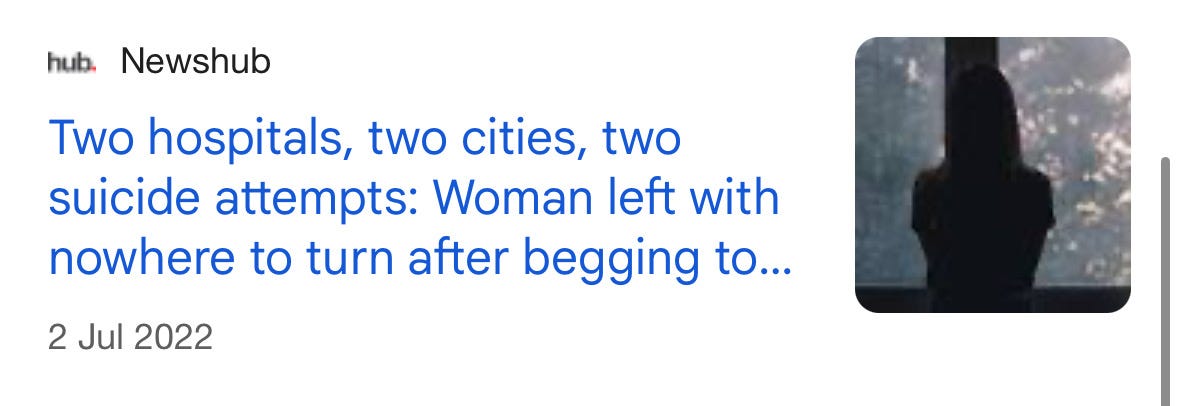
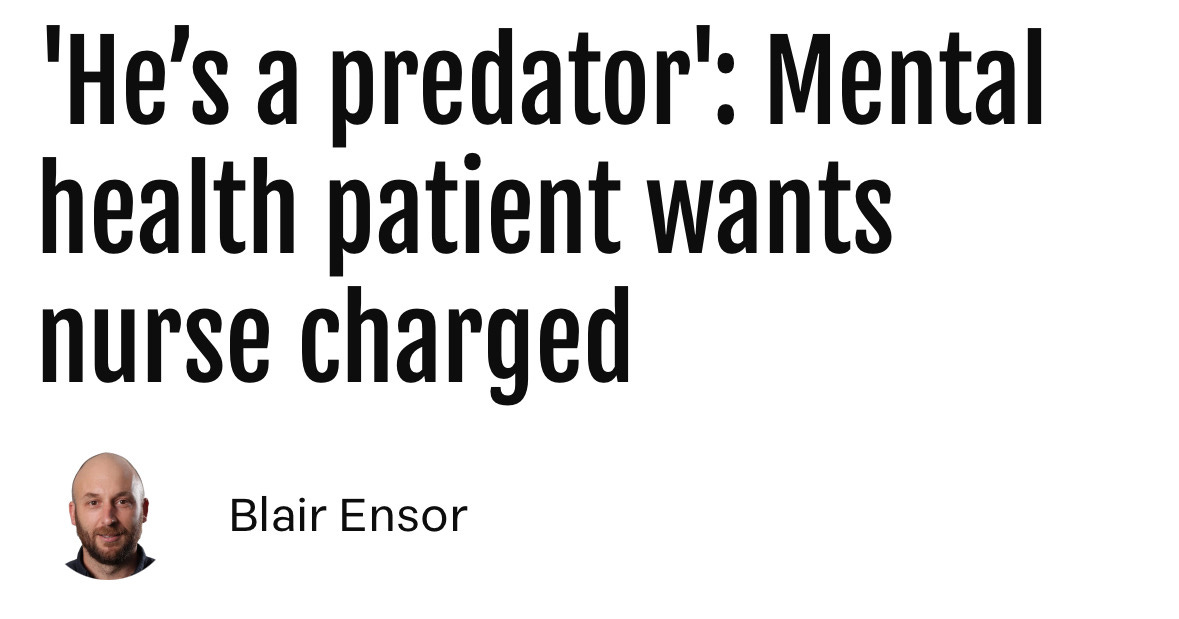
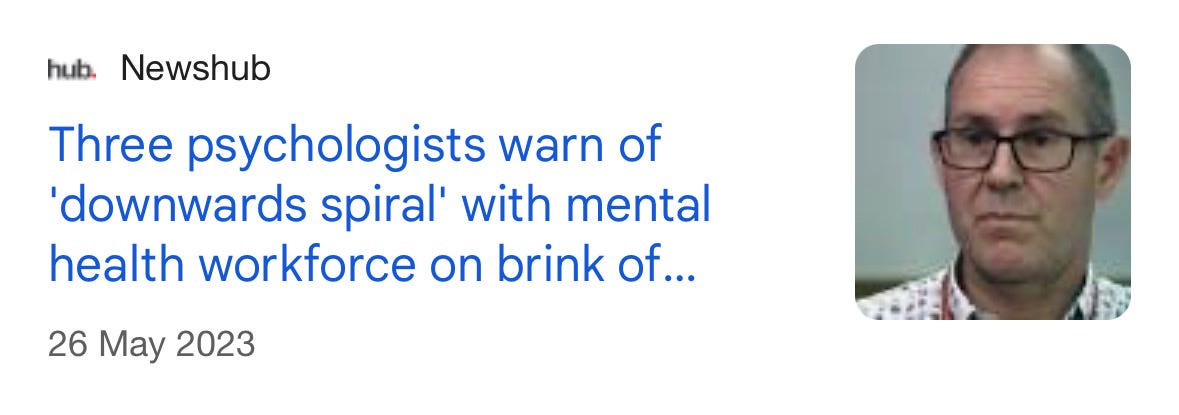


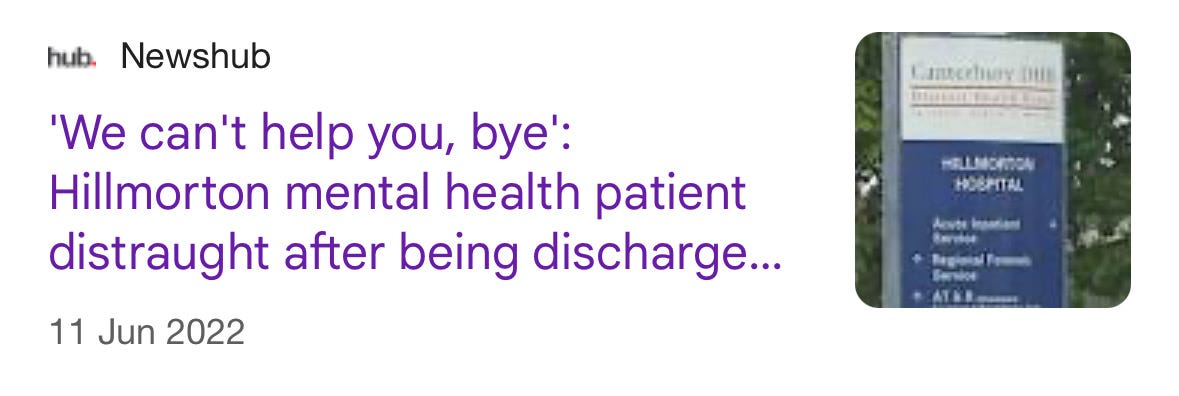
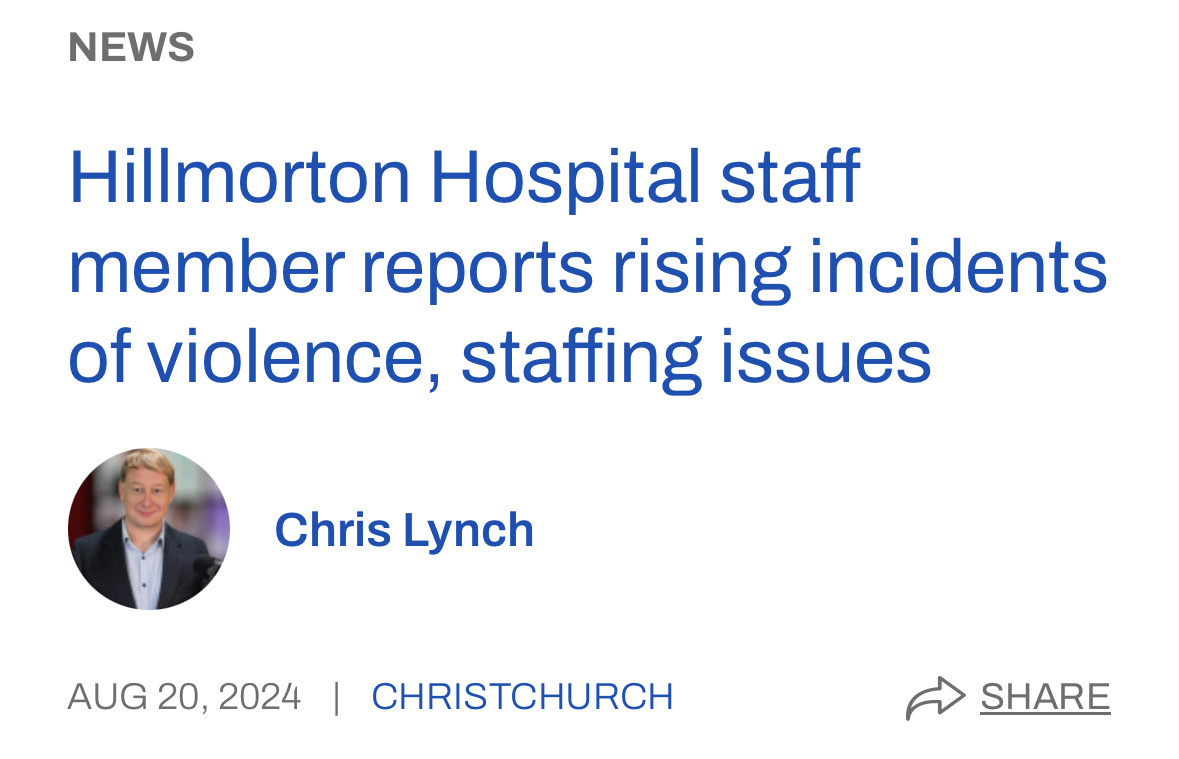
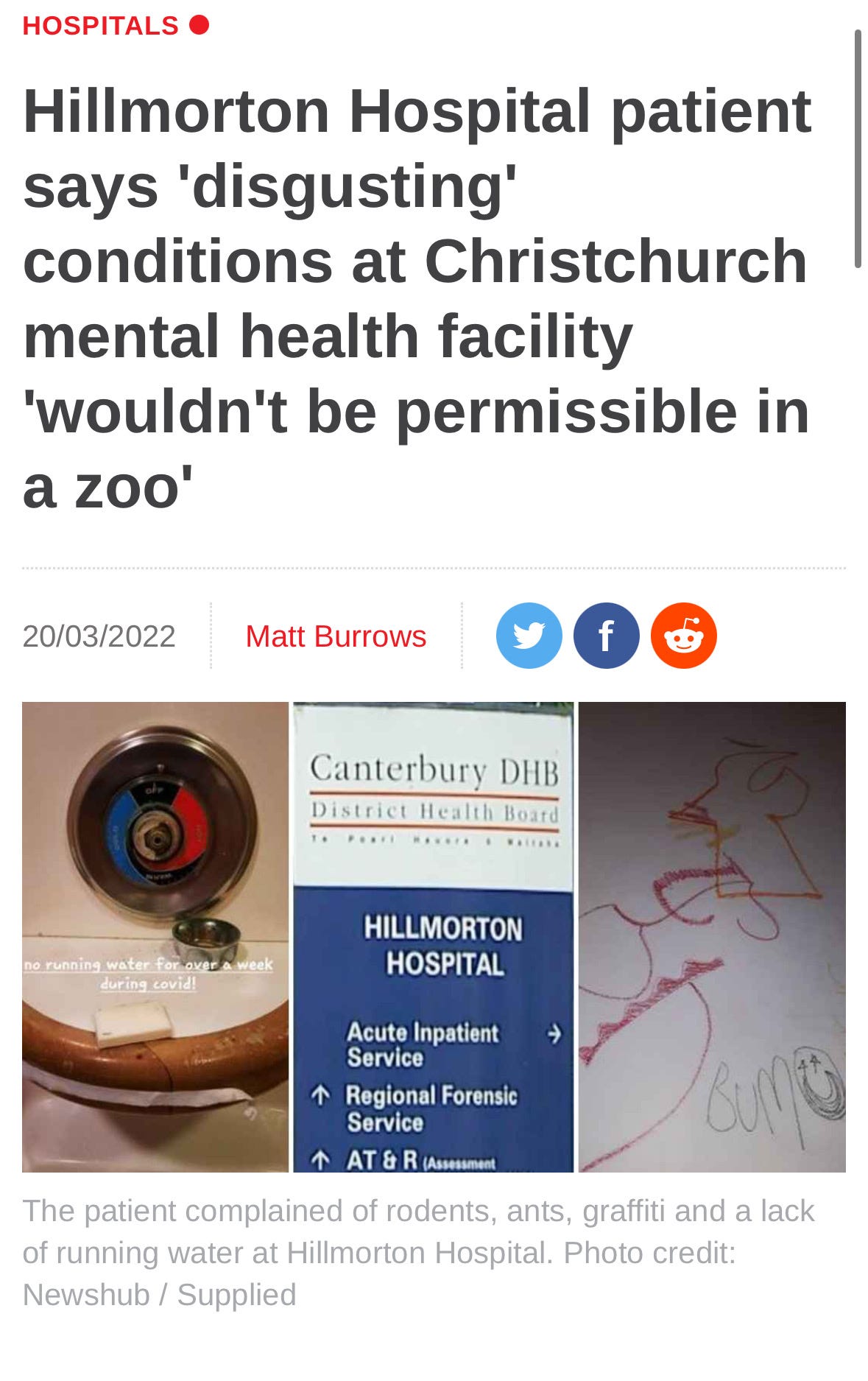
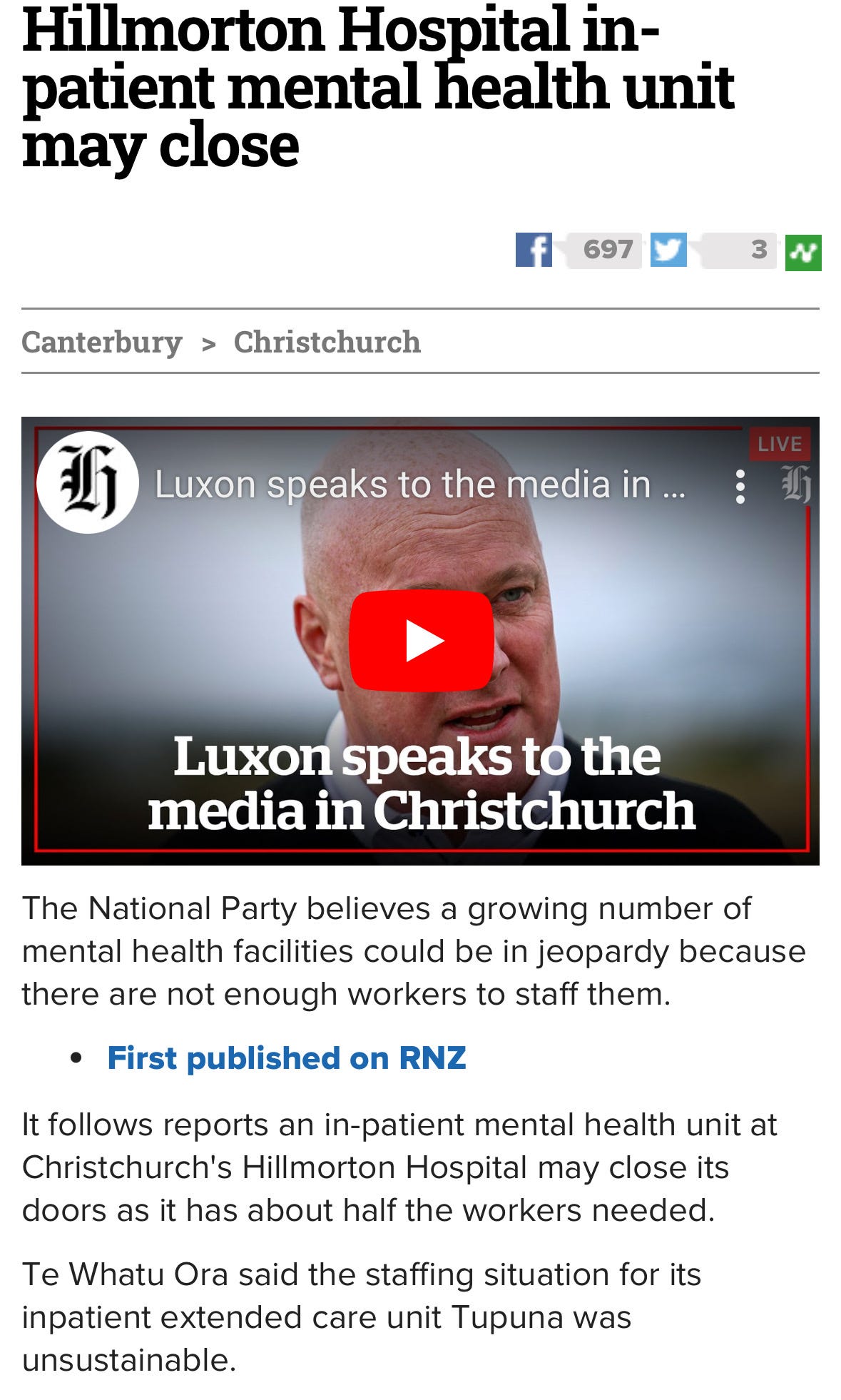
👍💯Absolutely - I read the stats about road deaths v suicide - the thing about road deaths is they can engineer better roads, improve car safety, etc. whereas mental health is a people & not an engineering problem & solution.
Taking your points, it is obvious that solutions are available but require priority funding for services at the front end (as you rightly point out a 24/7 help line should be manned 24/7) & training for responders, but also priority funding for training, recruiting & retaining appropriate mental health practitioners sufficient to treat all-comers as soon as the need arises. My experience is via your story but also 2nd hand of people in my wider circle who tell the same story of how hard it was to get timely help, and the devastating effects of failing & losing beloved parents, children, friends, workmates... If your car crashes, Police & Ambulance drop everything & rush to the scene - who has decided that mentally vulnerable people don't deserve the same? ⁉️🤬